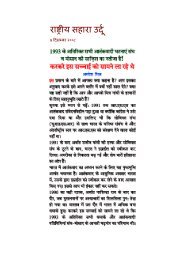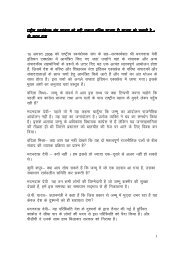Shastra Poojan - Indiannationalism.org
Shastra Poojan - Indiannationalism.org
Shastra Poojan - Indiannationalism.org
You also want an ePaper? Increase the reach of your titles
YUMPU automatically turns print PDFs into web optimized ePapers that Google loves.
changed dramatically in the past two decades.<br />
Whereas earlier, there was an irrational but<br />
unflinching faith in Fortress India, growing<br />
prosperity and global exposure has led to a<br />
significant erosion of the siege mentality (the<br />
ultra-nationalist section of NRIs may be an<br />
exception). However, far from generating a<br />
healthy cosmopolitanism there has been a<br />
temptation to swing to the other end of the<br />
spectrum.<br />
The point can be best illustrated by an observation<br />
by Brian Sedgemore, a Left-wing British<br />
politician. Writing in 1977 on the tedious<br />
negotiations over Europe, he noted that "officials<br />
interpret being a good European as being<br />
synonymous with selling out British interests". He<br />
smelt a "Vichy mentality", the willingness to mask<br />
surrender in the cloak of nationalism, as Marshal<br />
Petain did after the fall of France to the Germans<br />
in 1940.<br />
There is little evidence to indict Indian officialdom<br />
for displaying a capitulationist streak. On the<br />
contrary, there is reason to believe that Indian<br />
diplomats fought hard, negotiated well and upheld<br />
national interest during discussions on the N-deal.<br />
It is, for example, now becoming evident that the<br />
Indian negotiators were unaware of the contents of<br />
the 'secret' letter sent by the Bush Administration<br />
to Tom Lantos. Yet, the statement by the<br />
American Ambassador to India that the US had<br />
shared with the Indian Government the contents of<br />
the letter cannot be disregarded.<br />
It prompts the conclusion that the Indian<br />
leadership knew more about the real thinking in<br />
the US Administration than it let on. In other<br />
words, there was a significant mismatch between<br />
how officials and the political leadership perceived<br />
national interest. The divergence is not difficult to<br />
fathom. Since liberalisation changed the face of<br />
the economy, India has seen the emergence of a<br />
class more at ease with global citizenship than<br />
Indian citizenship. The manifestation of this shift<br />
was evident in the defeatist impulses that greeted<br />
the azadi hysteria in the Kashmir Valley, the<br />
pusillanimity over terrorism and, earlier, in the<br />
pro-appeasement noises over Pakistan and China.<br />
On the nuclear question this perspective was best<br />
expressed by Rajiv Desai, a publicist for the<br />
8<br />
Congress. Explaining NDA's defeat in 2004, he<br />
wrote: "When the Congress came to power three<br />
years ago, middle class hearts were gladdened.<br />
Having supported the Neanderthal Democratic<br />
Alliance led by BJP, many were dismayed by the<br />
1998 N-tests, following which India became a<br />
pariah of the international community." Match this<br />
statement with those TV pundits who wonder why<br />
India is making a fetish of retaining the right to<br />
conduct N-tests -- "we don't need it, so why insist<br />
on it", they say -- and you can gleam the Vichy<br />
mentality in India.<br />
There may be compelling arguments why science<br />
has made N-tests as irrelevant as indigo<br />
plantations. In that case, why wasn't the<br />
Government more forthright about it and willing<br />
to incorporate it in the 123 and NSG agreements?<br />
It would have made life easier at Vienna. If there<br />
is an abhorrence of N-arms in India, why didn't the<br />
Government repudiate Pokhran-II and undertake a<br />
rollback?<br />
Are we to assume that the political leadership is<br />
afraid of public opinion favouring a strong India,<br />
values sovereignty and believes in nationalism?<br />
The nuclear debate has been marked by<br />
widespread intellectual dishonesty. The<br />
Government has fallen back on needless secrecy<br />
and practised covert diplomacy in an age of<br />
information overload. It refused to make public the<br />
IAEA draft on the ground that it could provoke<br />
"nuclear terrorism" only to see it floating on the<br />
Internet. Since 2004, the MEA has closed its doors<br />
to scrutiny and prefers dealing with what Arun<br />
Shourie calls a "managed media".<br />
The daddy-knows-best syndrome, so prevalent in<br />
the pre-information age, has persisted in today's<br />
India, triggering a distorted debate and generating<br />
lively but needless conspiracy theories. So much<br />
so that in the past three years there was more<br />
information about the deal coming from American<br />
quarters than the Indian Government. This lack of<br />
transparency will ensure that the nuclear deal will<br />
remain at the heart of many future political storms.<br />
India's nuclear assets won't be compromised as<br />
long as there is institutionalised vigilance to deter<br />
the Vichy mentality. --<br />
September 7, 2008 The Pioneer



![tks fgeky; lk Ĺapk] xaxk lk fouez gks](https://img.yumpu.com/26586052/1/184x260/tks-fgeky-lk-lapk-xaxk-lk-fouez-gks.jpg?quality=85)

